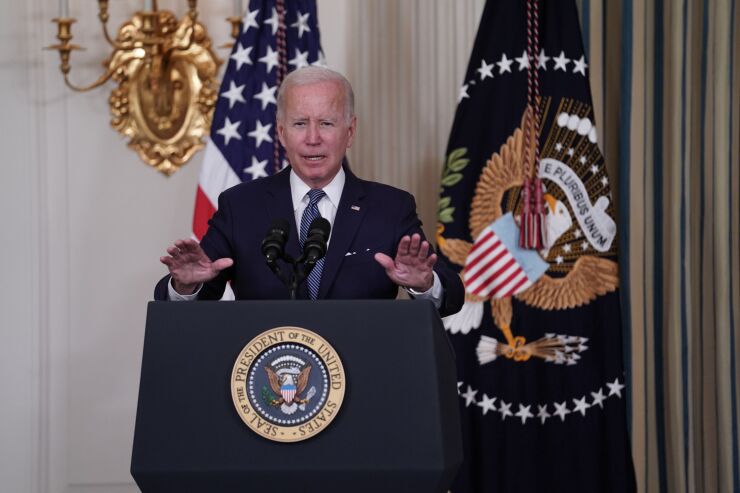President Biden announced a
"The burden is so heavy that even if you graduate you may not have access to middle-class life that the college degree once provided," Biden said Wednesday at the White House.
"I made a commitment that we would provide student debt relief. And I'm honoring that commitment today," he added.

Biden also announced a four-month extension of the moratorium on student loan repayments, as well as plans to allow borrowers with undergraduate loans to cap repayments at 5% of their monthly income.
Taken together, the measures seek to make good on a Biden campaign promise and to curry favor with younger and progressive voters, whose support could help Democrats hoping to stave off a loss of their slim House and Senate majorities.
The announcement caps a good month for Biden, which saw the passage of a massive Democratic climate, health care and tax package, signs that inflation may be beginning to moderate, and the unemployment rate falling to pre-pandemic lows. Democrats are hopeful the assistance on student loans as well as the Supreme Court decision overturning the right to an abortion nationwide will push voters to the polls.
Biden had been under pressure from progressive lawmakers, civil rights groups and labor leaders to forgive higher debt loads, arguing they are disproportionately carried by Black or lower-income students. While the final plan falls short of those expectations, most advocates praised the president's moves.
The $20,000 in debt forgiveness will apply to loans for those who also receive Pell grants. For most student-loan holders, the limit will be $10,000. That figure — paired with a $125,000 income cap for individuals and $250,000 for households — is in line with a level Biden has been weighing for several months.
The Biden administration will also propose a new rule capping borrowers from paying more than 5% of their monthly discretionary income on undergraduate federal loans — down from 10% today. The proposed rule also says that borrowers who make less than 225% of the federal minimum wage — roughly $30,577, or what a full-time worker earning $15 per hour earns — are not required to make payments on their federal undergraduate loans, according to the Department of Education.
The rule calls for the government to forgive loan balances of $12,000 or less after a borrower has made 10 years of payments. Currently, borrowers must pay their loans for two decades and have a balance below that amount to have debt forgiven.
The proposal also would restrict unpaid monthly interest from accruing as long as borrowers are making payments, so those who are benefiting from capped loan payments won't see their overall balances grow.
Although they'd pushed for a higher per-borrower debt relief figure, progressives lawmakers hailed the forgiveness of $20,000 for Pell grant recipients as a major win. Broader loan cancellation amounts for low-income people had been a major goal.
"With the flick of a pen, President Biden has taken a giant step forward in addressing the student debt crisis by cancelling significant amounts of student debt for millions of borrowers," Sen. Elizabeth Warren and Senate Majority Leader Chuck Schumer said in a joint statement.
The NAACP, which had been critical of the $10,000 figure, said the final plan brought the group closer to its "ultimate goal of alleviating the burden of student debt."
"We've got a ways to go, but the NAACP is proud that we were able to push President Biden to exceed $10,000, bringing us closer to $50,000 and beyond," Derrick Johnson, the group's president, said in a statement.
Biden said on Twitter: "In keeping with my campaign promise, my Administration is announcing a plan to give working and middle class families breathing room as they prepare to resume federal student loan payments in January 2023. I'll have more details this afternoon."
Other advocates, while celebrating the news, noted that it won't affect all borrowers.
"While this announcement is a major win for many, it is important to stress that $10,000 will leave many others still crushed by debt, and important details will determine who has access to much-needed relief," said Natalia Abrams, president and founder of Student Debt Crisis Center.
The latest repayment pause would be the final one that Biden backs, a person familiar with the matter said, meaning payments that had been on hold for nearly two and a half years will resume in January. One more extension will allow time to process loan balances and reboot a system that has been on hiatus, the person said.
It's the seventh extension of the freeze since the COVID-19 pandemic began in March 2020, and carries the political benefit of keeping loan repayments from kicking in two months ahead of the midterms. The latest pause in loan repayments was set to expire Aug. 31.
"It's time for the payments to resume," Biden said Wednesday.
Republicans have been critical of the move, arguing it would fuel inflation and put taxpayers on the hook.
"President Biden's student loan socialism is a slap in the face to every family who sacrificed to save for college, every graduate who paid their debt, and every American who chose a certain career path or volunteered to serve in our Armed Forces in order to avoid taking on debt," Senate GOP Leader Mitch McConnell said in a statement.
Rep. James Comer of Kentucky, the ranking Republican on the House Oversight Committee, called the plan "unfair to hardworking Americans who do not hold a college degree or who made tough financial decisions to pay for their college education."
Biden pushed back on the criticism in his remarks.
"I understand not everything I'm announcing today is going to make everybody happy. Some think it's too much," he said. "Some think it's too little. But I believe my plan is responsible and fair. It focuses the benefit on middle class and working families, and helps both current and future borrowers, and it'll fix a badly broken system."
A senior administration official pushed back on criticism that the debt-cancellation plan could exacerbate inflation, saying that the fiscal effects of targeting relief while restarting payments will be largely offset — and could even lower inflation in the long term.
Biden's moves would clear student debt for an estimated 20 million Americans, according to the official.
To qualify for relief, many borrowers will have to fill out an application that will be available in the coming weeks to verify their income levels. Roughly 8 million people have already submitted income information to the Education Department and may qualify for immediate forgiveness, the official added.
In his speech outlining the student debt plan, Biden also is expected to discuss ways to make the student-loan system more manageable for current and future borrowers by cutting monthly payments in half for undergraduate loans.
The Biden administration argues the package will help lower-income people, with 90% of the relief going to borrowers who earn less than $75,000 a year.
The Penn Wharton Budget Model out of the University of Pennsylvania estimated in an
— With assistance from Alex Tanzi, Janet Lorin, Jordan Fabian, Akayla Gardner and Justin Sink.






